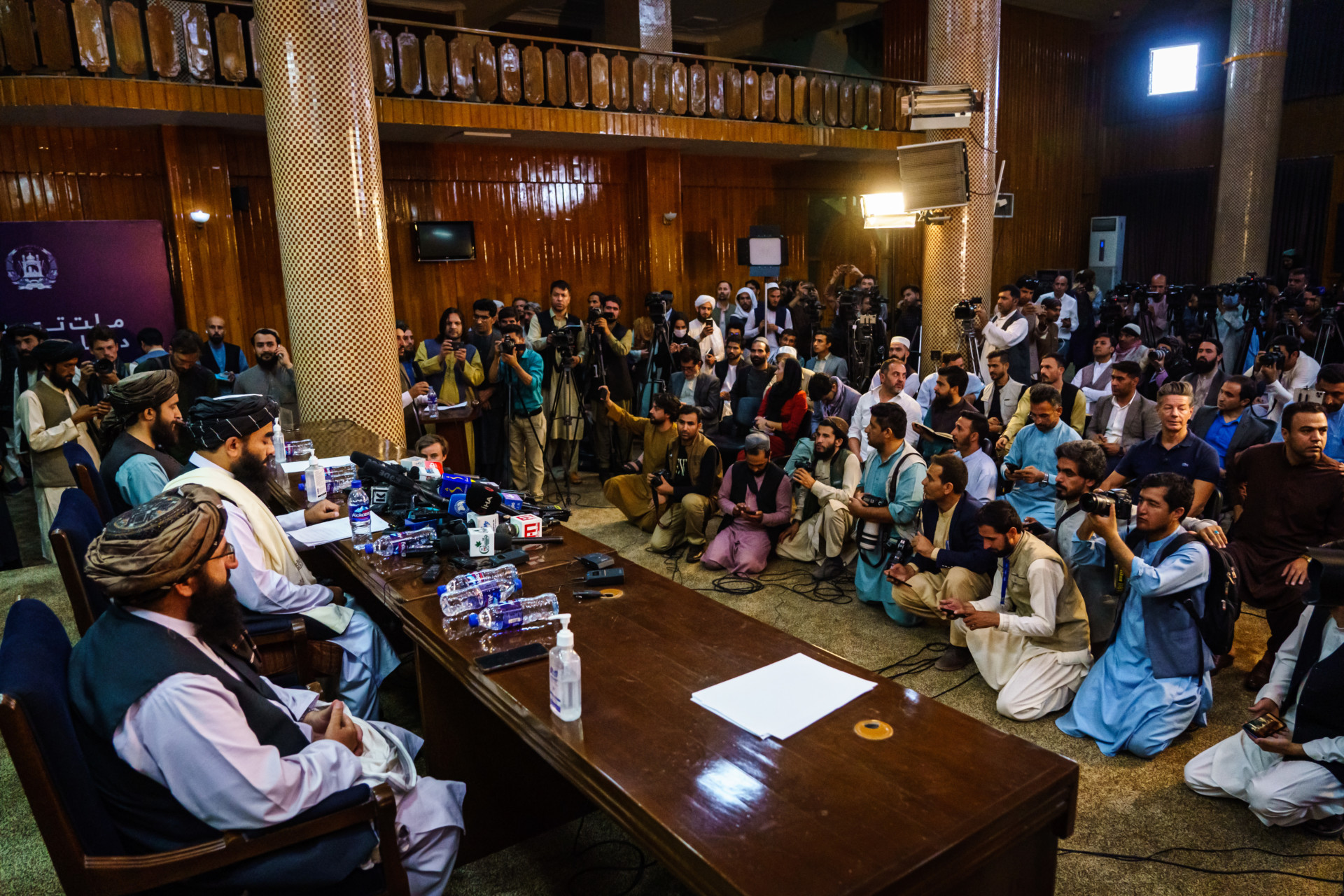The Taliban want international recognition for their government in Afghanistan, but they are not likely to change their ways for the long term. Meanwhile, they will probably face some resistance both domestically and among Afghanistan’s neighbors as security concerns mount in South and Central Asia.
In the wake of the swift collapse of the Afghan state the United States had spent 20 years building, the Taliban have retaken the country and are in the early days of the process of re-establishing the Islamic Emirate of Afghanistan. As part of this process, the Taliban leadership is meeting with key figures of the ancien regime with whom it had negotiated an understanding that allowed them to seize Kabul after the U.S.-backed now-former President Ashraf Ghani and his close associates fled the country. These talks will likely lead to a token presence of certain non-Taliban leaders in what will be a Taliban-dominated regime. The Afghan jihadist movement is trying to project itself as seeking an “inclusive” new political order, and, at the same time, is trying to use the structure of the now-defunct Islamic Republic of Afghanistan to avoid having to build its emirate from scratch.
With a Talibanized Afghanistan, a complicated series of geopolitical challenges lies ahead. South and Central Asia could face violent spillovers to neighboring states and an energized jihadist sentiment that can threaten regional stability. The Taliban also must operate in a challenging post-U.S. social and geopolitical environment that differs greatly from their last stint in power.
Emirate 2.0
The Taliban’s rhetoric suggests that the jihadist movement will have a different approach to ruling this time around, with their officials using words like “inclusion,” “women’s rights,” and “amnesty” in their discourse. This new approach aims to gain international recognition and its perks. However, the most likely scenario for the Taliban is a difficult balancing act between pragmatism and their old ways as the movement moves to consolidate its power and seek international recognition.
Given their radical ideology, there are limits to how different the new Taliban regime is likely to be from the previous one. For example, within the first 48 hours of taking power, the Taliban issued an amnesty toward all public-sector employees and encouraged them to return to their offices. A female anchor appeared on Afghanistan’s national television channel in a hijab and not the custom veil that used to be mandatory under Taliban rule, and a small convoy of Shiite mourners commemorating the sacred anniversary of Muharram was allowed to march through Kabul. However, only a couple of days later there are reports that the group removed a statue of a Hazara Shiite leader as well as Shiite mourners’ banners, and female anchors were told starting Monday only men would be allowed on television.
The Taliban compared the recapturing of Kabul to the conquering of Mecca, an event central to Islam and Islamic history and narratives, in which Prophet Mohammed entered the holy city without a fight and negotiated a surrender from the ruling elites. The use of history to capture the moment is not new. The Islamic State and Shiite militias have resorted to link their actions to historic developments to spread their message and reach potential supporters by stoking sentiments that such historic events invoke in many Muslims around the world.
Moreover, the Taliban takeover of Afghanistan could be a catalyst for a more aggressive approach to realizing Islamist rule in other countries. Political Islam has failed in states like Tunisia, Egypt, and – to a large extent – Iraq. The Islamic State, though initially appealing to some, was far too brutal and ambitious in its pan-Sunni political project to sustain. The Taliban’s emirate, however, will be seen as a way to balance between invoking nostalgia for conquest and jihad and a more local, nationalist approach. The Taliban might not allow foreign fighters within its ranks, as the group sees no need to wage jihad outside the country. However, the Taliban could allow other transnational jihadist groups to operate within Afghanistan, except for the Islamic State in Khorasan, which the Taliban view as enemies.
The next few months will provide important insights into the strategy of the nascent and feeble resistance. Anti-Taliban forces from the newly deposed regime, especially those connected to U.S. intelligence via the National Directorate for Security, are not likely to surrender easily or quickly to a Taliban-led order. These militias – and certain warlord holdouts such as Abdul Rashid Dostum, Atta Muhammad Noor, Amrullah Saleh, and Ahmad Masood – are a threat to the Taliban because they give the U.S. and its allies a potential avenue for trying to undermine the new order that the Taliban is trying to build. Elements of the Afghan military and police, in many instances tied to local tribal and ethnic power brokers throughout the country, are at best ambivalent partners to the Taliban and could become active opponents the new regime in a future moment of crisis. The Taliban’s military campaign relied on bartering the surrender of its opponents, many of whom disliked the Ghani-led government as much as they hated the Taliban, and the “surrenders” were often symbolic.
Many of these surrendering Afghan forces are likely expecting that the new emirate will be more generous than Ghani’s government, and if that does not happen, there will be a persistent threat of uprisings. Therefore, over the next few months, the Taliban are likely to focus on grafting their shadow administration to the existing structures of the Afghan state. In historically anti-Taliban regions of the country, especially in Tajik-, Hazara-, and Uzbek-majority areas, this amalgamated administration’s ability and willingness to funnel state resources down to the Taliban’s former enemies will make or break the new government.
Afghanistan is already one of the most foreign assistance-dependent states on the planet and will need that assistance to continue in order to stave off the collapse of many communities throughout the country. This is likely be an early test of the Taliban’s diplomatic skills. The new emirate is likely to focus on maintaining international channels of assistance into Afghanistan, probably funneled through state structures, to gain and hold the loyalty of the Taliban’s potential enemies. Ironically, a future U.S. acquiescence to a Taliban-led order in Afghanistan, particularly in allowing the new regime to access Afghan state money in U.S. jurisdiction, could be a key factor in the Taliban government’s survival.
Impact on Surrounding Regions
A Talibanized Afghanistan is a familiar reality to Afghanistan’s neighbors in South and Central Asia. In the 1990s, regional actors had to adjust their policy agendas to curtail regional violence and terrorist activity. This time, a Taliban-controlled Kabul presents new challenges to Afghanistan’s neighbors and international actors. While the Taliban are projecting a more moderate ideological narrative and a stated intention of stability – with the aim of obtaining international recognition – the organization has far more leverage than it did 20 years ago. The group has more advanced equipment and military tactics, and more diversified revenue streams and expanded illicit opium cash crops. It also consolidated near-complete control over the country with little resistance. Afghanistan’s neighbors – such as Iran, Russia, India, Uzbekistan, Tajikistan, and even Pakistan – will be making determinations soon on whether they can trust a Taliban-led regime to secure their national security interests.
This new reality has many of Afghanistan’s neighbors concerned about the Taliban’s ability to galvanize dormant Islamist movements both inside and outside of Afghanistan, spark cross-border violence and an influx of migrants, and compound Afghanistan’s already-robust opiate and emerging methamphetamine illicit markets. While many regional actors share similar anxieties, a Talibanized Afghanistan will incite a different set of behaviors among its neighbors.
For Tajikistan, Uzbekistan, and Turkmenistan, the fear of emboldened jihadist activity along their borders with Afghanistan and inside their own borders will likely intensify counterterrorism policies. The Taliban’s control of bordering provinces and, notably, the Sher Khan border post, will incentivize Central Asian governments to increase border security and boost their defenses through existing Chinese and Russian military support and by asking the U.S. to establish operational outposts and communication channels with the Taliban to dissuade support of radical groups.
In traditional transit and destination countries for illicit substances and migrants from Afghanistan, such as Turkey, Pakistan, and Europe, the primary concern will be preparing border customs and law enforcement systems to prepare for a large-scale influx of trafficked goods and refugees. Turkey has begun to erect a wall along its frontier with Iran in an effort to stave off a migrant exodus. Meanwhile, France has issued warnings against migrants wishing to settle there and has coordinated with Germany and other EU allies to identify an effective response mechanism that can manage a migrant crisis.
For regional powers like Iran, China, and Russia, the departure of U.S. and NATO forces eliminated a primary rival in Afghanistan and introduced limited opportunities to project influence. Iran’s Islamic Revolutionary Guard Corps, which has a well-established relationship with the Taliban, has new level of leverage in Afghanistan now that the Taliban have consolidated their influence. The renewed counterterrorism concerns among Central Asian republics have offered Moscow and Beijing the chance to establish deeper security footprints in the region by building more outposts, engaging in a series of joint military exercises, and shaping a new level of military dependency among Afghanistan’s neighbors. However, new levels of instability will challenge regional powers’ interests in the region, posing risks to prized infrastructural projects such as parts of the Belt and Road Initiative, trade and transportation routes, and even their own domestic stability.
Critical Immediate Measures
With no military on the ground and a weakened intelligence presence, the U.S. should work closely with partners in Afghanistan who have direct and indirect contact with the Taliban to monitor and assess the possibility of al Qaeda regrouping or organizing under the Taliban. If anti-Taliban actors create zones within Afghanistan that are outside of Taliban control, the U.S. should investigate opportunities to engage with these actors and work with them, if their goals align with American interests.
Meanwhile, the U.S. should capitalize on Central and South Asian countries’ common security concerns to counter its near-peer competitors and establish a comprehensive regional strategy. The U.S. should continue efforts in assisting Pakistan, Tajikistan, Uzbekistan, and Turkmenistan in increasing border patrol and defense capacities in the face of Afghan instability and encroaching Chinese and Russian influence.
While the U.S. failed in its 20-year effort to establish a viable Afghan state, it did succeed in engendering a vibrant civil society, and it behooves the Biden administration to do all it can diplomatically and through financial leverage to secure the societal gains. Afghanistan’s civil society has the potential to challenge the Taliban in ways that an armed resistance could not.
Rasha Al Aqeedi is a Senior Analyst and the Head of the Nonstate Actors program in the Human Security Unit at the Newlines Institute. Prior to joining the Newlines Institute, Al Aqeedi was the editor in charge of “Irfaa Sawtak,” a U.S.-based platform that offers insights into post-conflict communities in Iraq and Syria. She has also served as a Fellow with the Foreign Policy Research Institute and George Washington University’s Program on Extremism and tweets at @RashaAlAqeedi.
Dr. Kamran Bokhari is Director of Analytical Development at the Newlines Institute. Dr. Bokhari is also a national security and foreign policy specialist at the University of Ottawa’s Professional Development Institute. Bokhari has served as the coordinator for Central Asia Studies at the State Department’s Foreign Service Institute (FSI). Follow him on Twitter at @KamranBokhari.
Nicholas A. Heras is Senior Analyst and Program Head for State Resilience and Fragility in the Human Security Unit at the Newlines Institute. Prior to the Newlines Institute, he was the Director of Government Relations and the Middle East Security Program Manager at the Institute for the Study of War (ISW). Nicholas has authored or co-authored numerous reports and analytical articles on topics concerning Global and Middle East security issues, presented widely on these topics to multiple U.S. government and military agencies, and non-government organizations. He has been a frequent commentator to the media on Global and Middle East security issues. He tweets at @NicholasAHeras.
Caroline Rose is a Senior Analyst and Head of the Strategic Vacuums program in the Human Security unit at the Newlines Institute. Her commentary and work on geopolitics and Middle Eastern affairs have been featured in Foreign Policy, The Independent, Alhurra, Limes Magazine, and the Atlantic Council’s MENASource. You can follow her on Twitter at @CarolineRose8.
The views expressed in this article are those of the authors and not an official policy or position of the Newlines Institute.









